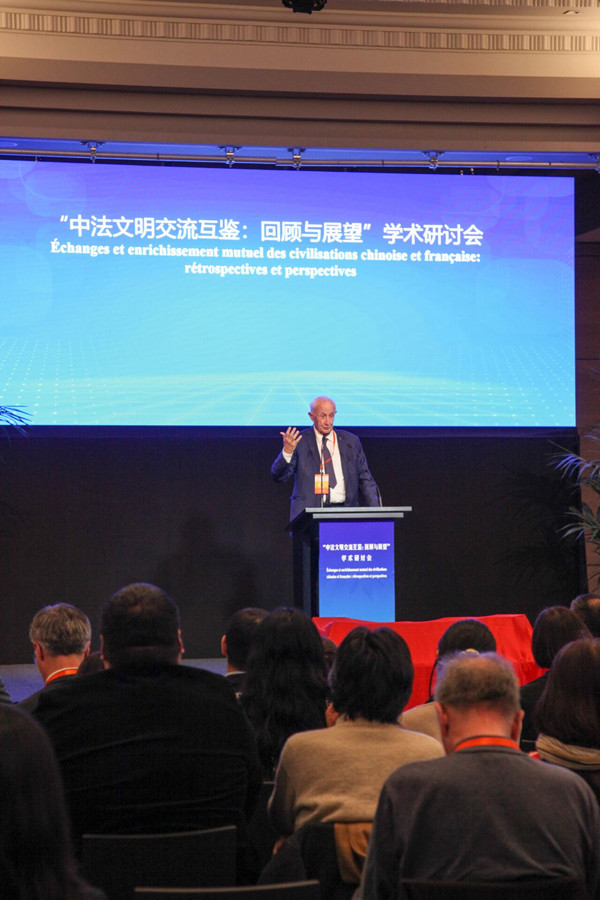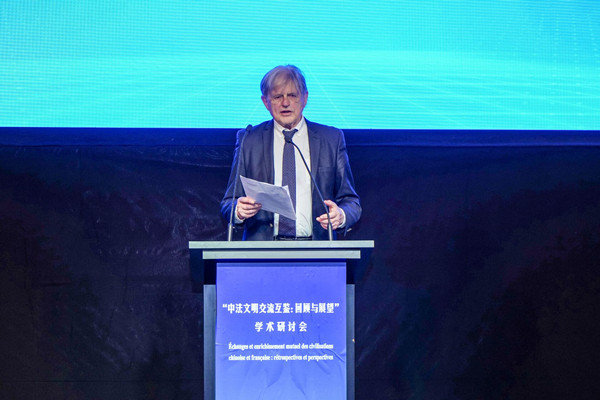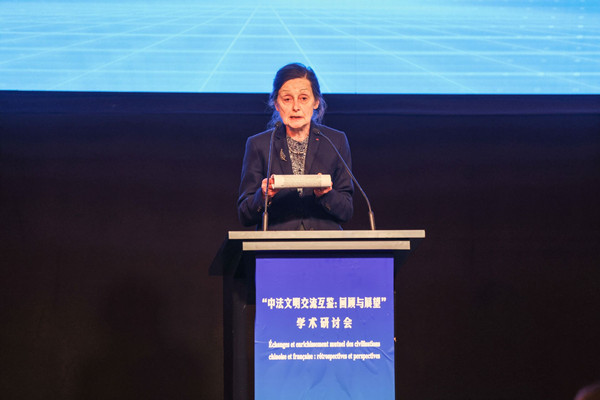


Writing a brilliant chapter of exchanges and mutual learning between civilizations: Three prestigious French scholars tell stories of China-France exchanges
On May 3, 2024, a seminar titled “Exchanges and Mutual Learning Between Chinese and French Civilizations: Review and Outlook” was convened in Paris, France. The seminar was co-hosted by the Chinese Academy of Social Sciences and the Paris-based National Institute for Oriental Languages and Civilizations. Over a hundred experts and scholars hailing from various think tanks, universities, and research institutes held in-depth discussions on such topics as “practice and testimony of civilizational exchanges,” “retrospection and reflection on mutual learning between civilizations,” and “sci-tech innovation and the future of human civilization.”
At the opening ceremony of the seminar, two French academicians and one renowned French cultural scholar shared vibrant accounts of their friendly exchanges and collaborative ventures with China. With their respective personal experiences, they composed a brilliant chapter of exchanges and mutual learning between civilizations, upholding the beauty of each civilization and the diversity of civilizations around the world. A highlight of the conference, their eloquent speeches added a memorable historical color to the development of Chinese-French ties. Learning from the past to forge the future, China and France should not only bear this history in mind and cherish it, but also carry it forward to create a new future of bilateral relations.
Henry de Lumley: Pioneer of China-France joint archaeology

Henry de Lumley Photo: BUREAU OF INTERNATIONAL COOPERATION at CASS
Henry de Lumley is director of the Institute of Human Paleontology in Paris, a corresponding member of the French Academy of Sciences and the French Academy of Inscriptions and Letters, and a professor emeritus and former director of the French National Museum of Natural History. At a seminar titled “Exchanges and Mutual Learning between Chinese and French Civilizations” on May 3, 2024, Professor Lumley, at a spry 90 years of age, and brimming with pride and a sense of achievement, affectionately reviewed the 110-year history of Chinese-French cooperation in Paleolithic archaeology, as well as his nearly-50-year experience of exchanging with his Chinese counterparts.
China-France joint archaeological endeavors boast a solid foundation of collaboration. As early as in 1914, French naturalist, geologist, paleontologist, and archaeologist Emile Licent discovered the fossilized tooth of “Hetao Man,” the earliest-known human fossil found in China, alongside the first chipped stone tool, marking the beginning of his journey of Paleolithic archaeology in China. Subsequently, French archaeologists Pierre Teilhard de Chardin and Abbe Henri Breuil also came to China and participated in the excavation and research of the Peking Man Site at Zhoukoudian in suburban Beijing. They joined forces with a number of pioneering Chinese Paleolithic archaeologists, including Pei Wenzhong, Jia Lanpo, and Hu Chengzhi, together building a bridge for later China-France cooperation. In his speech, Professor Lumley reminisced that since 1980, he has cooperated with Chinese peers such as Li Yanxian and Gao Xing, fostering profound friendships with generations of Chinese archaeologists. Since then, Professor Lumley has visited China for research purposes almost annually, traversing the vast expanse of Chinese territory. “This is a privilege envied even by French ambassadors to China,” he said.
The Lumleys have been staunch advocates for fostering joint archaeology between China and France. Fellow Lumley-Woodyear, Professor Lumley’s wife and a respected French paleoanthropologist, joined the cause of China-France joint archaeology in the late 1970s, actively participating in visits to all hominid sites in China. Additionally, Professor Lumley extended invitations to Chinese archaeologists to visit France for academic exchanges and mentored numerous Chinese students pursuing doctoral degrees in French Paleolithic archaeology. Many of these scholars now serve as professors of archaeology in China, constituting the backbone of China-France joint archaeology.
In his speech, Professor Lumley also looked back at the course of China-France joint archaeology over the past nearly 50 years. He emphasized that Paleolithic archaeology is a multidisciplinary field, involving collaboration among archaeologists, zoologists, and botanists from both countries. Chinese scholars demonstrated exceptional professionalism, with many serving as visiting fellows at research institutes such as the French National Museum of Natural History, studying French hominid sites together with French experts. With joint efforts, Chinese and French scholars have conducted rather complete research on the natural environment, instruments of production, and material remains of hominid sites, systematically showcasing the historical value of the cultural relics and sites.
In 2004, Professor Lumley and his Chinese partners jointly staged an exhibition on ancient Chinese humans at the Musée de l’Homme in Paris. The exhibition showcased all Chinese hominin fossils, including those of the Peking Man and related relics, eliciting enthusiastic responses from the French. Thereafter, he published two French monographs together with Chinese scholars in 2017 and 2020, respectively, on the Yunxian Man Site in central China’s Hubei Province, and the Paleolithic site in the Bose Basin in Guangxi Zhuang Autonomous Region. Despite his advanced age, Professor Lumley remains deeply passionate about China-France joint archaeology. In early 2024, he revisited Hubei and signed an agreement with his Chinese counterparts on joint research on early Paleolithic stonework discovered on the high terraces of the Hanjiang River. His future plans include collaboratively publishing works in both Chinese and French to introduce this discovery and the latest research outcomes to the world.
Alain le Pichon: Promoter of intercultural understanding

Alain le Pichon Photo: BUREAU OF INTERNATIONAL COOPERATION at CASS
Alain le Pichon is a renowned French anthropologist and the founding president of the International TRANSCULTURA Institute.Born into a prominent French noble family in 1942, he diverged from the familial tradition of political and military careers to pursue an academic vocation.
In the 1970s, he became acquainted with Italian semiotician Umberto Eco and embarked on a career in intercultural studies. In their opinion, it is both necessary and possible to overcome existing cultural barriers, biases, arrogance, and ignorance to form an “intercultural” perspective, and thus they advocated for “looking to the East.” From this intercultural perspective, Professor le Pichon has proposed the concept of reciprocal anthropology in the belief that the world needs more anthropologists who travel between the Western and non-Western worlds. He has called on anthropologists in the “Third World” to write ethnographies about the West, which would allow non-Westerners to examine the West from an alternate perspective.
Back in the 1980s, Professor le Pichon faced unjust treatment due to his involvement in encouraging and aiding African anthropologists in their research on France. He paid a high price for his dedication to intercultural studies, losing his academic titles, his support from the French academic community, and his right to publish. Nevertheless, with a group of insightful scholars standing firmly behind him, he has persevered in his commitment to reciprocal anthropology to this day. By the late 1980s, he found solidarity within the Chinese academic community and initiated ongoing, deepening academic exchanges and cooperation with Chinese scholars.
Cooperation between China and France has been enduring and fruitful. In 1987, Professor le Pichon came to Sun Yat-sen University and began nearly 40 years of exchange and cooperation with the Chinese academic community. He collaborated extensively with renowned scholars Professor Tang Yijie and his wife, Professor Yue Daiyun from Peking University, co-founding a journal titled “Dialogue Transculturel” with Professor Yue Daiyun. Since the 1990s, he has engaged in consistent collaboration with Chinese scholars such as Zhao Tingyang, Wang Mingming, and Huang Ping. In 2019, The Shadow of Monotheism, a collection of correspondences between Professor le Pichon and Zhao Tingyang, were published in both Chinese and French. Professor le Pichon’s academic endeavors have far exceeded the scope of China-France bilateral relations and China-Europe relations in the narrow sense.
In the 1980s, Professor le Pichon and Umberto Eco, both leading figures in intercultural studies, co-founded the International TRANSCULTURA Institute in France. He realized that engagement and cooperation with the Chinese academic community played an essential role in facilitating cultural exchanges and mutual learning between China and France.
In the second decade of the 21st century, Professor le Pichon collaborated with Chinese scholars in organizing four EU-China High Level Cultural Forums. The first forum was held in 2010 in Brussels, seat of the European Commission, with the distinguished presence of the then Chinese Premier and the then-President of the European Commission delivering speeches. Subsequent forums were held in 2011 in the Palace Museum in Beijing, in 2012 in the Louvre in Paris, and in 2014 at Beijing Yanqi Lake International Convention & Exhibition Center, where the 22nd APEC Ministerial Meeting was held.
Effectively facilitated by Professor le Pichon and scholars from the Chinese Academy of Social Sciences such as Zhao Tingyang and Huang Ping, the compilation of the Euro-Chinese Dictionary of Cultural Misunderstandings was recently launched. This specific project of intercultural studies was carried out on a purely voluntary basis. At present, the first volume of the English version of this dictionary has been published. It comprises 34 entries, each with an article from the “Chinese perspective” written by a Chinese scholar, an article from the “European perspective” written by a European scholar, and a “dialogue and summary” co-authored by the two scholars based on their discussion. The authors adopt a historical and academic approach to trace the referential relations between a term listed in the dictionary and a specific concept within their own cultural traditions, as well as the evolution of such relations. In an attempt to engage in a dialogue with the other perspective within a common framework for understanding, the authors have explored the meanings, mistranslations, and misinterpretations of several key concepts in philosophy and social sciences within the China-Europe intercultural context.
At a seminar themed “Exchanges and Mutual Learning Between Chinese and French Civilizations” held on May 3, 2024, Professor le Pichon shared his insights into intercultural studies, his own academic experiences, and the history of his engagement and cooperation with the Chinese academic community. He also stepped down from the podium to present the Euro-Chinese Dictionary of Cultural Misunderstandings to the audience. Professor le Pichon noted that intercultural studies is his lifelong career and an important channel for promoting cultural exchanges and dialogue between China and Europe.
Marianne Bastid-Bruguière: Witness to China-France friendship

Marianne Bastid-Bruguière Photo: BUREAU OF INTERNATIONAL COOPERATION at CASS
Marianne Bastid-Bruguière is a renowned French sinologist, a member of the Academy of Humanities and Political Sciences in France, and former president of the European Association for Chinese Studies. Recognized for her contributions, she was awarded France’s highest order of merit, the “Grand Cross of the Legion of Honor.” Professor Bastid-Bruguière was born in 1940 to parents who were both renowned members at the French Academy of Sciences and professors of law. In 1951, at the age of 11, she met Hu Honglie, a Chinese student and protege of her mother, who introduced her to the charm of Chinese culture. Since then, Professor Bastid-Bruguière has been fascinated by Chinese history and language, leading her to study Chinese history as a career and develop a profound relationship with China spanning decades. Throughout her career, Bastid-Bruguière has harbored high hope and unwavering confidence in China’s trajectory. As she remarked in 2015, “I often say that China will rise and one should not assume that China will always lag behind. I’ve been saying this for nearly fifty years, yet I’m still amazed at China’s ever-changing development.”
Professor Bastid-Bruguière is a witness to the establishment and development of China–France relations after the founding of the People’s Republic of China. In 1964, France was the first major Western nation to formalize diplomatic relations with the New China. At that time, Bastid-Bruguière was writing her thesis on modern Chinese history. From 1964 to 1965, she made her first visit to China and worked as a French teacher at the Department of European Languages at Peking University. From 1965 to 1966 she assumed the position of a visiting scholar at the university. Subsequently, she began her academic career in Chinese history research at the French National Centre for Scientific Research. In retrospect, she fondly reminisced that during her time at Peking University, history courses were offered exclusively, but no language courses were available, so she had to rely on dictionaries to build her Chinese proficiency.
Professor Bastid-Bruguière is one of France’s foremost sinologists, with profound knowledge in research areas such as the history of China-France exchanges. In the 1980s, Professor Bastid-Bruguière pointed out that sinological research in Europe should highlight historical continuity, with a keen sensitivity to the characteristics of different cultures, which requires scholars to have a high level of language proficiency. She believed that the study of contemporary China needs to adopt an interdisciplinary approach, integrating methods from history, economics, anthropology, and other disciplines, so as to deepen the understanding of Chinese society with a broad-minded perspective.
Over the years, Professor Bastid-Bruguière has continuously explored the historical bonds of friendship between China and France. It is widely recognized in academia that Europe experienced a “China craze” during the 18th century. Despite changes in European perceptions of China during the 19th century, mutual appreciation and learning between intellectuals of both sides never ceased. Literary giants such as Hugo, Flaubert, Baudelaire, and Maupassant all held a deep interest in Chinese culture and art. Many poets drew inspiration for revitalizing French art from Chinese poetry, including Tang poems. In the meantime, Chinese scholars such as Lin Shu, Liang Qichao, and Su Manshu translated numerous French literary works, which were well received by intellectuals in China.
Professor Bastid-Bruguière is not only a participant but also a diligent advocate of cultural exchanges between China and France. She firmly believes that without the land of China and without the study of the Chinese people, she would have achieved nothing. In the 1960s, during her work and study in China, she formed strong bonds with historians at Peking University. In 1965, she wrote to Mr. Zhang Zhilian, one of the founders of the study of French history in New China and a professor in the Department of History at Peking University at that time, seeking academic assistance. After communicating with Mr. Jian Bozan, a respected scholar, the then director of the Department of History, Mr. Zhang Zhilian invited Mr. Shao Xunzheng, who had studied in France, to be her mentor. Expressing profound reverence and gratitude towards Mr. Zhang Zhilian and Mr. Shao Xunzheng, Professor Bastid-Bruguière attests to their pivotal influence on her academic journey. At a seminar commemorating the centenary of Mr. Zhang Zhilian’s birth in 2018, she lauded his wisdom, cultivation, active spirit, and his mastery of bilingual conversation in English and French. The insights and wisdom imparted by the older generation of Chinese scholars left a deep mark on Professor Bastid-Bruguière’s academic career.
Dedicated to fostering academic exchanges between China and France, Professor Bastid-Bruguière has actively promoted scholarly collaboration since the 1980s. She was appointed as an honorary professor in the Department of History at Peking University and in that capacity delivered lectures in China on multiple occasions. During her tenure as vice president of the Ecole normale supérieure in Paris, she invited many scholars from Peking University to give lectures in France. To this day, Professor Bastid-Bruguière has frequently interacted with several generations of historians in China, particularly those who study French history, while warmly welcoming successive generations of young Chinese scholars for academic exchanges in France.
At the academic seminar “Exchanges and Mutual Learning Between Chinese and French Civilizations” held on May 3, 2024, Professor Bastid-Bruguière reflected on her extensive engagement with China, marveling at the remarkable transformations witnessed over the course of the nation’s development.
Editor:Yu Hui
Copyright©2023 CSSN All Rights Reserved